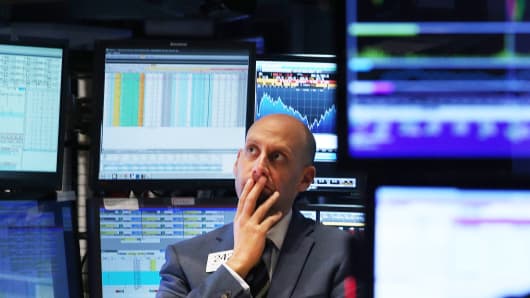I simply can't resist the temptation to draw parallels between the markets and the autumn storm in the U.K. last week. The tempest is back.
It's been a bruising couple of days for investors as volatility is rearing its ugly head once again.
Yes, it was an eerily quiet summer which saw volatility in equity, foreign exchange and bond markets drop to multi-year lows and equity markets marking fresh highs. We all knew that complacency is dangerous.
The lashing of the first autumn storm - even if it was expected - is still painful.
After the initial shock of seeing the biggest drop in U.S. Treasury yields in five years and major equity indices touching correction territory, the finger pointing has begun. It's the Fed removing the punchbowl for investors. Wait, no, it's Ebola. Or maybe the return of the euro zone debt crisis. Ha, it's the threat of deflation!
Whatever the reason - and it's likely a combination of all of the above and some technical factors such as profit taking - investors, either still licking their wounds or celebrating if their positioning in this turmoil paid off, are wondering: what's next?
In the absence of a crystal ball, I resort to three opinions from investment professionals. Strikingly, they all tell investors to look through the volatility and accumulate equity holdings.
Alan Higgins, Chief Investment Officer for Coutts declares boldly: "Volatility brings opportunity". He says the firm keeps its positive stance on risky assets, as economic fundamentals remain sound and sees the current dislocation in the market as a buying opportunity: "In particular we favor buying some beaten-up equity markets with defensive characteristics like Germany and the U.K. We also favor European and Japanese banks, which are trading at extremely low valuations despite substantial improvement in the health of their balance sheets."
Higgins goes on to recommend to trim exposure to "safer" government and investment grade bonds in favor of equity allocations, as " their future long-term return potential has fallen sharply"
Similar musings have been made by Lothar Mentel, Chief Investment Officer at Tatton Investment Management and a frequent guest on CNBC.
"Markets are once again severely overreacting and there is no good medium-term investment justification to accept reduced equity allocations", Metel writes, partly because of corporate earnings growth and more attractive valuations.
"We have all balanced portfolios on Thursday by selling some of what they had gained in their government bond positions and topping up on our equity allocations back to the target weights we have had since August "
Meanwhile, Thomas J. Lee, Managing Partner at Fundstrat Global Advisors is relying on technical indicators as he proclaims there is a "glimmer of hope the worst is ending". For example, Lee argues that stocks are cheap.
He says 35 percent of the S&P500 and 19 percent of the Russell 2000 have a dividend yield greater than the yield on 10-year Treasury notes, the highest since June 2013 and double the long term average.
As I am quoting the investment professionals' cautiously bullish views, I am starting to wonder. Why is it that none of the three and many others in the market tell their clients to get out and cut their losses - stay risk averse, buy Treasurys and gilts, get out of risky assets like equities and stay in cash?
How do we know the peak of volatility and the brunt of selling is over?
Haven't we learned from 2008/09 and 2011/12?
Granted, buying on the dip has been a fairly successful strategy so far this year. But just because it worked in an environment where volatility was low and central bank support was ample, doesn't mean it is the most sensible investment strategy in a high volatility period in which we find ourselves in now!
Similarly, just because risk assets look cheap on a historical basis doesn't mean they're a buying opportunity. Could it be that stocks now are cheap for a reason? That reason being potentially more gyrations in the market as sentiment towards the world economy sours further and central banks are running out of options to patch up investor confidence.
The sun may make an appearance again now and then and give us a deceivingly beautiful autumn day, but don't pack away your umbrellas just yet.



